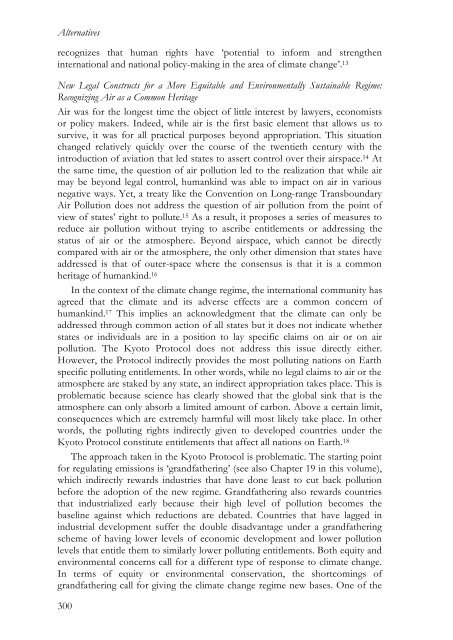Upsetting the Offset - Transnational Institute
Upsetting the Offset - Transnational Institute
Upsetting the Offset - Transnational Institute
Create successful ePaper yourself
Turn your PDF publications into a flip-book with our unique Google optimized e-Paper software.
Alternatives<br />
recognizes that human rights have ‘potential to inform and streng<strong>the</strong>n<br />
international and national policy-making in <strong>the</strong> area of climate change’. 13<br />
New Legal Constructs for a More Equitable and Environmentally Sustainable Regime:<br />
Recognizing Air as a Common Heritage<br />
Air was for <strong>the</strong> longest time <strong>the</strong> object of little interest by lawyers, economists<br />
or policy makers. Indeed, while air is <strong>the</strong> first basic element that allows us to<br />
survive, it was for all practical purposes beyond appropriation. This situation<br />
changed relatively quickly over <strong>the</strong> course of <strong>the</strong> twentieth century with <strong>the</strong><br />
introduction of aviation that led states to assert control over <strong>the</strong>ir airspace. 14 At<br />
<strong>the</strong> same time, <strong>the</strong> question of air pollution led to <strong>the</strong> realization that while air<br />
may be beyond legal control, humankind was able to impact on air in various<br />
negative ways. Yet, a treaty like <strong>the</strong> Convention on Long-range Transboundary<br />
Air Pollution does not address <strong>the</strong> question of air pollution from <strong>the</strong> point of<br />
view of states’ right to pollute. 15 As a result, it proposes a series of measures to<br />
reduce air pollution without trying to ascribe entitlements or addressing <strong>the</strong><br />
status of air or <strong>the</strong> atmosphere. Beyond airspace, which cannot be directly<br />
compared with air or <strong>the</strong> atmosphere, <strong>the</strong> only o<strong>the</strong>r dimension that states have<br />
addressed is that of outer-space where <strong>the</strong> consensus is that it is a common<br />
heritage of humankind. 16<br />
In <strong>the</strong> context of <strong>the</strong> climate change regime, <strong>the</strong> international community has<br />
agreed that <strong>the</strong> climate and its adverse effects are a common concern of<br />
humankind. 17 This implies an acknowledgment that <strong>the</strong> climate can only be<br />
addressed through common action of all states but it does not indicate whe<strong>the</strong>r<br />
states or individuals are in a position to lay specific claims on air or on air<br />
pollution. The Kyoto Protocol does not address this issue directly ei<strong>the</strong>r.<br />
However, <strong>the</strong> Protocol indirectly provides <strong>the</strong> most polluting nations on Earth<br />
specific polluting entitlements. In o<strong>the</strong>r words, while no legal claims to air or <strong>the</strong><br />
atmosphere are staked by any state, an indirect appropriation takes place. This is<br />
problematic because science has clearly showed that <strong>the</strong> global sink that is <strong>the</strong><br />
atmosphere can only absorb a limited amount of carbon. Above a certain limit,<br />
consequences which are extremely harmful will most likely take place. In o<strong>the</strong>r<br />
words, <strong>the</strong> polluting rights indirectly given to developed countries under <strong>the</strong><br />
Kyoto Protocol constitute entitlements that affect all nations on Earth. 18<br />
The approach taken in <strong>the</strong> Kyoto Protocol is problematic. The starting point<br />
for regulating emissions is ‘grandfa<strong>the</strong>ring’ (see also Chapter 19 in this volume),<br />
which indirectly rewards industries that have done least to cut back pollution<br />
before <strong>the</strong> adoption of <strong>the</strong> new regime. Grandfa<strong>the</strong>ring also rewards countries<br />
that industrialized early because <strong>the</strong>ir high level of pollution becomes <strong>the</strong><br />
baseline against which reductions are debated. Countries that have lagged in<br />
industrial development suffer <strong>the</strong> double disadvantage under a grandfa<strong>the</strong>ring<br />
scheme of having lower levels of economic development and lower pollution<br />
levels that entitle <strong>the</strong>m to similarly lower polluting entitlements. Both equity and<br />
environmental concerns call for a different type of response to climate change.<br />
In terms of equity or environmental conservation, <strong>the</strong> shortcomings of<br />
grandfa<strong>the</strong>ring call for giving <strong>the</strong> climate change regime new bases. One of <strong>the</strong><br />
300
















